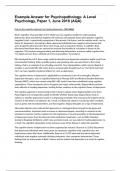Example Answer for Psychopathology: A Level
Psychology, Paper 1, June 2018 (AQA)
Discuss the cognitive approach to treating depression. (16 Marks)
Beck's Cognitive Triad and Ellis's A-B-C Model are two cognitive models for understanding
depression. Beck asserted that negative self-schemas and cognitive biases that uphold a cognitive
(negative) triad—a pessimistic perspective of the present, the future, and the outside world—are to
blame for depression. According to Beck, depressed individuals have negative self-schemas that
were shaped by adversity when they were young, such as parental criticism. In addition, Beck
discovered that those who are sad tend to overlook the benefits of a situation in favour of the
negatives. This involves overgeneralizing and distorting information, a process called cognitive bias.
'I've failed one test; thus I will flunk all of my examinations,' for instance.
Ellis developed the A-B-C three-stage model to describe how depressive symptoms might result from
unreasonable thinking. When a buddy ignores your greeting when you pass them in the school
hallway, that is an example of an activating event (A). Your interpretation, which may be illogical or
sensible, is your belief (B). Ellis claims that an unreasonable thought (such as "my friend must hate
me") can have negative emotional effects (C), such as depression.
The cognitive theory of depression's applicability to treatment is one of its strengths. Effective
depression therapies, such as Cognitive Behavioural Therapy (CBT) and Rational Emotive Behaviour
Therapy (REBT), which was created using Ellis' ABC model, have been established using cognitive
explanations. These treatments aim to recognise and reject unfavourable, illogical ideas and have
been effective in treating depression, lending further credence to the cognitive theory of depression.
The cognitive approach's shortcoming is that it doesn't explain where illogical beliefs come from.
Psychologists are consequently unable to identify whether depressing, illogical ideas result in
sadness or whether depression results in a depressing mentality. This is because the majority of the
research in this field is correlational. As a result, it's likely that sadness is caused by other variables,
such as genes and neurotransmitters, and that negative, illogical thoughts are a sign of depression.
Alternative theories also contend that depression is a biological illness brought on by genes and
neurotransmitters. Serotonin levels are lower in depressed people, according to research on the
substance's function. Further evidence for the importance of neurotransmitters in the development
of depression comes from the discovery that medication treatments, such as SSRIs (Selective
Serotonin Reuptake Inhibitors), which raise serotonin levels, are successful in treating depression. As
a result, the cognitive explanation as the exclusive cause of the disease is called into question.
The cognitive theory of depression has been supported by research. Boury et al. (2001) discovered
that depressed individuals were more prone to experience cognitive triad, cognitive bias, and
hopelessness about the future. Additionally, Bates et al. (1999) observed that when depressed
individuals read negative automatic thinking statements, their symptoms deteriorated. These
findings back up many tenets of Beck's theory and the notion that depression is a result of negative
thinking.




